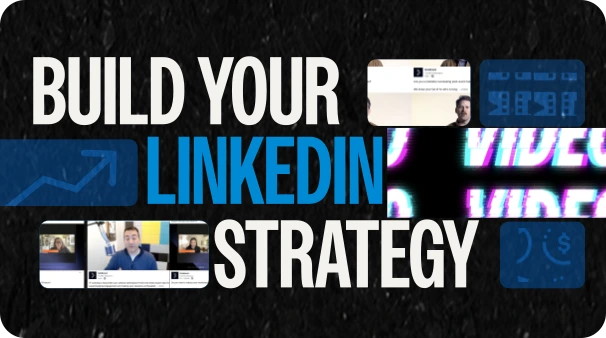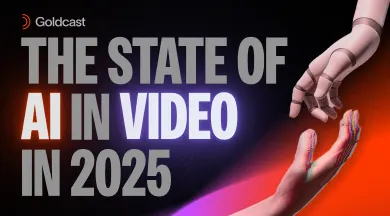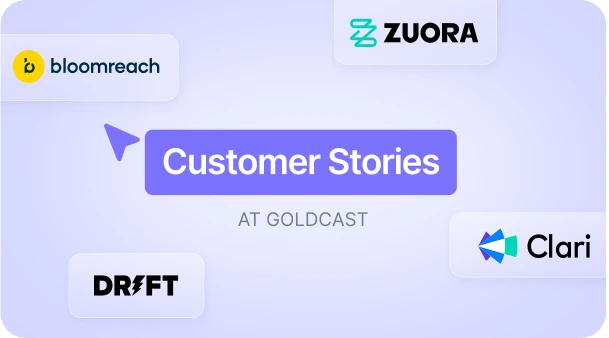What is Demand Generation, Anyway? 16 Top Brands and Marketers Define It
Table of Contents
Maximize Your Marketing ROI
Join 10,000 other marketers already getting the best tips on running engaging events that boost pipeline and create raving fans.
In the grand scheme of things, "demand generation" is still a pretty new field, and defining it can be nearly impossible, especially with how quickly things change.
At this point, we've heard a million different explanations given for what demand gen is—okay, maybe we're exaggerating a little, but seriously, if you've ever joined us for Donuts & Demand, you know that every demand gen marketer has a slightly different way of explaining what they do!
We thought it would be super helpful—and fun, even!—to dive into what top brands and marketers have to say about demand generation, in order to paint a clearer picture of what demand gen is (and isn't).
This is important stuff because as our field evolves, we're seeing more and more event marketers report up through Demand Generation. We're also seeing a lot more folks in Demand Gen who own and handle all things event-related.
Annnnd….these changes are the exact reason why we shifted our annual compensation survey to include demand gen marketers, so we could get a broader picture of everyone who handles events and what they're paid. If you haven't seen the report yet, consider this your official invitation to download it today!
DOWNLOAD THE DEMAND GEN COMPENSATION REPORT
Anyhow, we digress. Back to defining demand generation!
Read on for:
- How leading brands define demand generation
- How top marketers define demand generation
- How do you define demand generation?
And if you want to hang out with us for the next Donuts & Demand event, we'd love to have you! We always have so much fun talking to top demand gen marketers about their best tips, where they find sprinkles of inspo, and more.
How leading brands define demand generation
![[object Object]](https://cdn.sanity.io/images/2939l4aj/production/7697e317b244536d13704876889891d2ed847a35-1200x691.png?w=800)
Here’s a glance at how some of the world's most noteworthy brands think about demand generation:
HubSpot defines demand generation as follows: “Demand generation captures the umbrella of marketing programs that get customers excited about your company’s product and services without trying to explicitly sell to them.”
Amazon chimes in with, “While a demand generation strategy technically encompasses the entire customer journey from interest all the way to lead generation, an easier way to think about demand generation is through the lens of how a potential customer feels about your product or service.”
Then we've got Drift, which states that demand generation is "a marketing strategy that includes any activity that drives awareness and interest in your product or service. The ultimate goal is to create a predictable pipeline that will grow your business."
For the fans of brevity in our audience, Cognism keeps it short and simple: "Demand generation is the entire range of B2B marketing and sales initiatives that generate interest in your company’s product or service."
Rounding out the pack so far is Gartner, whose definition looks like this: "Demand generation is a data-driven marketing strategy focused on driving awareness and interest in an organization's products and services, with the ultimate goal of developing long-term customer engagement. Demand generation includes lead capture, lead nurturing and pipeline acceleration."
Finally, Chili Piper has a very important reminder—you aren't selling to people as a demand gen marketer! Instead, "demand generation is the continuous process of educating out-of-market buyers (non-solution seeking people) about your products and services without trying to explicitly sell to them."
NOTE: A common thing we've seen is that people confuse demand gen with lead gen and think it's all the same thing—but they're two very different functions! As you'll see more when we dive into individual marketers' definitions, demand generation marketers are typically thinking more long-term than lead gen folks, who want to drum up interest in the short term.
How top marketers define demand generation
We always open every Donuts & Demand session by asking our guests one simple—yet not simple at all—question: How do you define demand generation?
Here are the answers we've gotten so far! As you read, note the ways they are similar and the ways in which they are different, which likely has to do with each marketer's personal experience within their roles. (Oh, and follow these folks on social already!)
If you're a demand gen marketer, what do you agree or disagree with? Do you have anything to add? We'd love to hear your opinions!
We'll kick things off with Angela Romero of Spekit, who gave us an unexpectedly on-brand answer that's too sweet not to share! 🍩🍩🍩
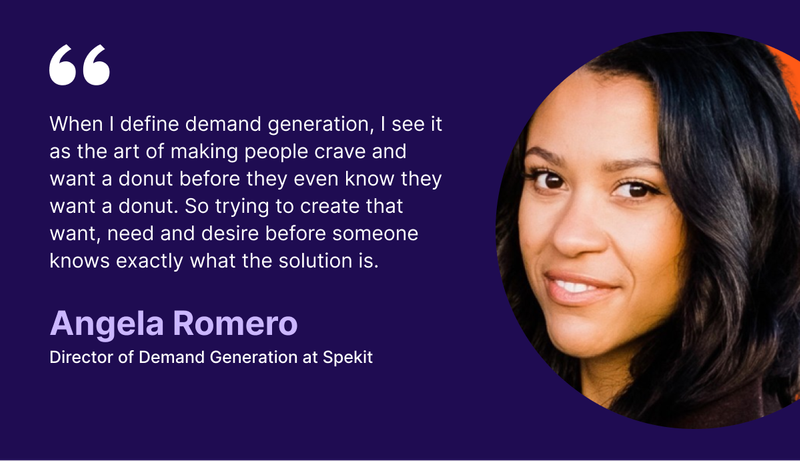
Brendan Hufford, Founder of Growth Sprints ties it back to the five stages of awareness, as proposed by Eugene Schwartz:
- Unaware
- Problem aware
- Solution aware
- Product aware
- Most aware
The job of demand gen folks is to take people from the "unaware" phase into the "problem aware" and, ultimately, "solution aware." Being able to alert people that they've got a problem they didn't even know they had, and then travel with them through the rest of the stages, is a pretty sweet gig.
For Sarah McConnell, VP of Demand Generation at Qualified, it's pretty literal:
It all comes back to the word "demand." In her role, Sarah's looking to create demand for her company and their products, and for her that goes further than acquiring customers or audience members. While she's certainly thinking about pipeline since that's what she's held accountable to as a metric, she knows that building awareness is a huge part of that.
Joyce Chuang, Senior Director of Marketing of DocuSign told us that demand generation is a longtail game. Demand generation marketers are focused on a long-term strategy of how to create awareness and educate in order to get prospects. All the while, demand gen marketers are thinking about things from a holistic perspective and considering the customer's point of view.
LaShanda Jackson, Global Director of Lifecycle Marketing at Intuit Mailchimp, wants to know and deeply understand who her target audience is. She's focused on building a content ecosystem that provides value to her audience and meets them where they're at, whether that's via intent data, personalization, or something else.
Next up, a flaming hot take: Chris Walker, CEO at Passettoo and Chairman at Refine Labs, wants to kill the term "demand generation" altogether because he thinks it's confusing and tries to group a bunch of separate things under the same umbrella.
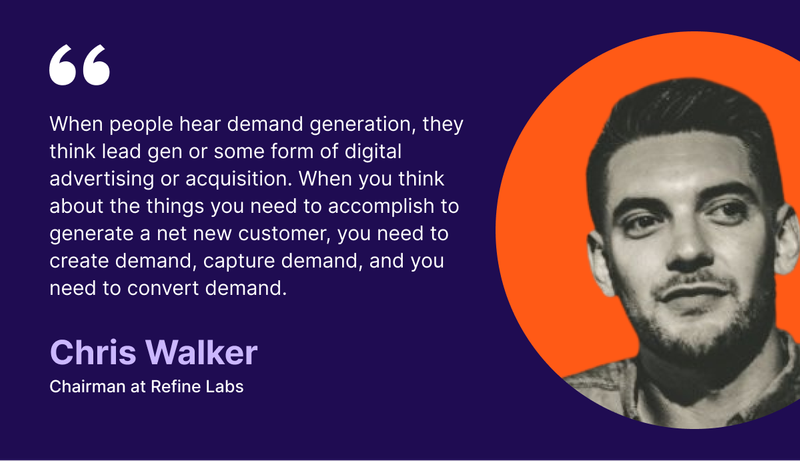
Chris is looking at those three buckets and recognizing that sales, SDRs, and marketing can play in all three areas. Ideally, marketers have measurement and attribution systems for each of those core processes, whereas most B2B systems right now only effectively measure demand capture and demand conversion. This biases things toward performance marketing, outbound SDRs, events, and sales.
Zsuzsanna Blau is Global Head of Digital Demand and Campaigns at Nokia. She thinks of demand generation as an "investment in brand and a bet on the future"—we love how that just rolls off the tongue so beautifully! Take a listen:
Zsuzsanna goes on to say that demand gen involves talking about your category more than your actual product—she believes demand gen marketers should be focused on creating more educational, generic content in order to raise awareness and interest in your brand.
Michelle Blondin is currently the Growth, Optimization, and Global Demand Generation Leader at ZoomInfo. She sees demand gen marketers as creating and capturing demand, noting that demand gen is so much more complex than just generating demand. It takes a holistic effort from your brand team, your SDR folks, your dev team, your salespeople, etc.
Brian Hansford, VP of Growth at LiveRamp, thinks of demand gen in terms of reaching your audience before they're ready to buy so that they're primed to reach out to you when they are ready to make a decision. That means you're educating your audience and creating useful content for them, all the while building trust and engaging folks.
How do you define demand generation?
Now we want to hear from you! We hope you'll join us at an upcoming Donuts & Demand and let us know how you think about demand generation. How do you define it? Were there any definitions you strongly agreed with today? Was there anything here that surprised you?
The chat is always poppin' at D&D, and we can't wait to hear your thoughts!
Stay In Touch
Platform
Resources
Company
Community
© 2025 Copyright Goldcast, Inc. All rights reserved.



 Upcoming Events
Upcoming Events Event Series
Event Series On-Demand Events
On-Demand Events